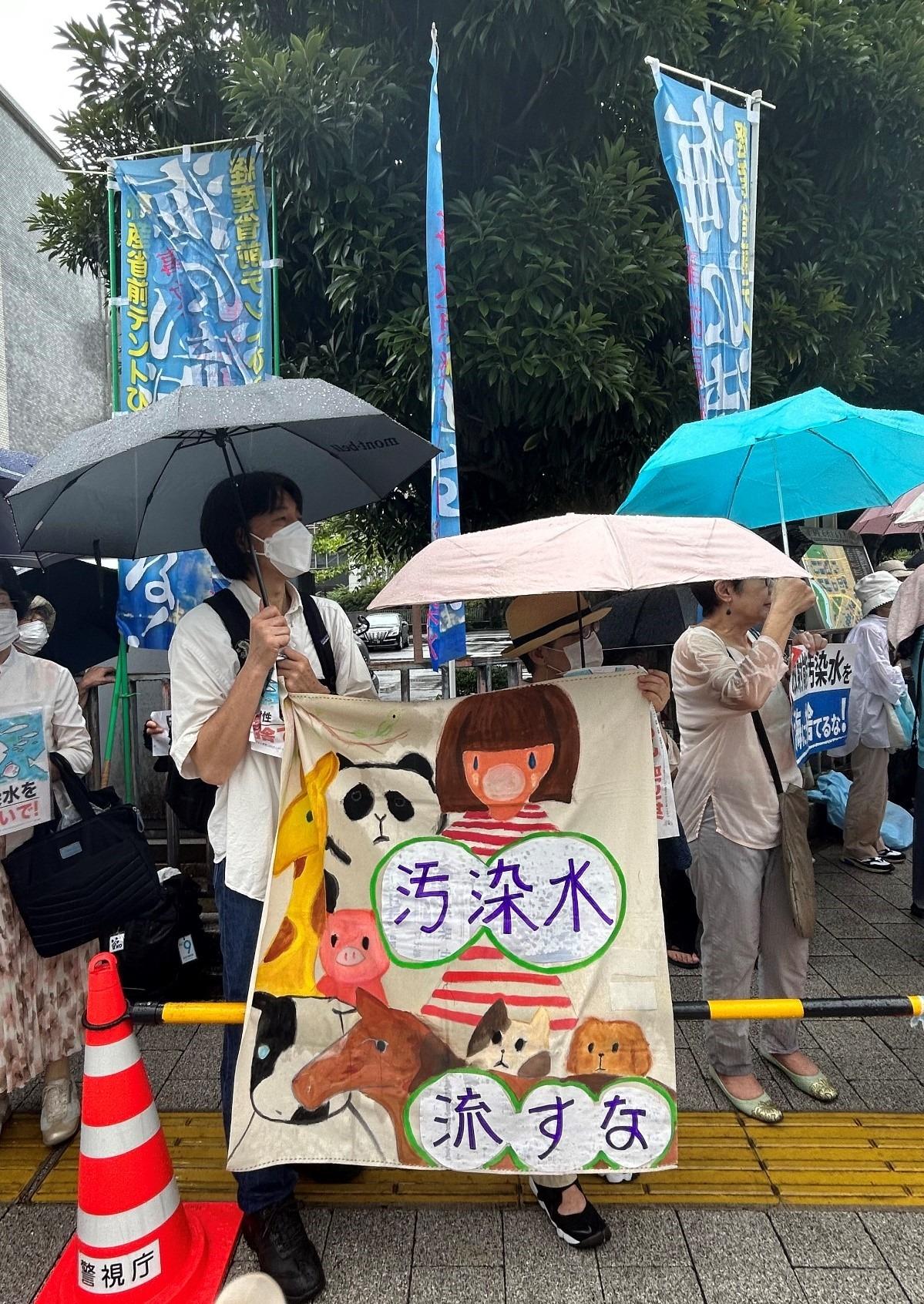 People across Japan protest against the ocean discharge of nuclear-contaminated water from the Fukushima Daiichi nuclear power plant in front of the prime minister’s official residence in Tokyo on Aug 22, 2023. Despite domestic and overseas opposition, the Japanese government decided to start the release on Aug 24 if weather and marine conditions allow. (JIANG XUEQING / CHINA DAILY)
People across Japan protest against the ocean discharge of nuclear-contaminated water from the Fukushima Daiichi nuclear power plant in front of the prime minister’s official residence in Tokyo on Aug 22, 2023. Despite domestic and overseas opposition, the Japanese government decided to start the release on Aug 24 if weather and marine conditions allow. (JIANG XUEQING / CHINA DAILY)
TOKYO - The Japanese government’s announcement on Aug 22 to officially start releasing nuclear-contaminated wastewater from the Fukushima Daiichi nuclear power plant into the Pacific on Aug 24 has drawn wide criticism with protests in Tokyo.
As the Fumio Kishida cabinet cleared its plan, people from across Japan staged a protest outside the prime minister’s official residence on Aug 22.
Shigeru Tokiwa, a book editor in Tokyo, was among the protesters voicing deep distrust of their government.
“This administration has been starting with lies from the very beginning. It’s just shameful, isn’t it?” Tokiwa said.
Prime Minister Kishida said on Aug 22 the government will oversee the discharge of the so-called treated water and safely decommission the wrecked plant
Releasing nuclear-contaminated water into the ocean means that radioactive substances will circle the whole world, which he believes is not a good thing.
Prime Minister Kishida said on Aug 22 the government will oversee the discharge of the so-called treated water and safely decommission the wrecked plant. He also stressed that authorities will respond to the concerns of local communities and fishermen over reputational damage and the continuation of business.
ALSO READ: Beijing: New Fukushima nuclear water leak sparks global concerns
The Japanese government has set up funds worth 30 billion yen ($205.71 million) to overcome the reputational damage to fishery products and 50 billion yen to ease potential economic damage and support local fishermen in sustaining their businesses.
But Hori said relying only on temporary money to support local fishermen’s livelihoods is wrong, not to mention that there are more problems to come.
“Many people would probably start eating less seafood products from Fukushima if they feel they can’t eat with peace of mind. If that happens, I believe local residents would struggle in their livelihoods,” said Sei Tamamori, a resident in Kawasaki, Kanagawa prefecture, who attended the rally in Tokyo on Aug 22.
 Japanese Prime Minister Fumio Kishida, (center) speaks during a meeting with representatives of the Inter-Ministerial Council for Contaminated Water, Treated Water and Decommissioning Issues and the Inter-Ministerial Council Concerning the Continuous Implementation of the Basic Policy on Handling of Advanced Liquid Processing System (ALPS) Treated Water, at the prime minister's office in Tokyo on Aug 22, 2023. (PHOTO / AP)
Japanese Prime Minister Fumio Kishida, (center) speaks during a meeting with representatives of the Inter-Ministerial Council for Contaminated Water, Treated Water and Decommissioning Issues and the Inter-Ministerial Council Concerning the Continuous Implementation of the Basic Policy on Handling of Advanced Liquid Processing System (ALPS) Treated Water, at the prime minister's office in Tokyo on Aug 22, 2023. (PHOTO / AP)
“The government call the water released from the Fukushima nuclear plant ‘treated water,’ but in reality, this is actually contaminated water that they’re trying to rebrand,” Tamamori said.
“The current administration is not informing the citizens of the truth. It really makes me angry. If they would listen to the voice of the people and reflect on their actions, they should stop releasing nuclear-contaminated water into the sea,” Tamamori added.
Before deciding the specific timing of the release, Kishida held a meeting with fishing industry representatives at his office on Aug 21 and asked for their understanding on the government’s policy.
He explained that the decommissioning of the Fukushima Daiichi nuclear power plant was a prerequisite for the reconstruction of Fukushima Prefecture and that the disposal of contaminated water was a prerequisite for the decommissioning.
 Protests continue in front of the prime minister’s official residence in Tokyo on Aug 22, 2023 as the Japanese government announced its decision to start the release of Fukushima nuclear waste water. (JIANG XUEQING / CHINA DAILY)
Protests continue in front of the prime minister’s official residence in Tokyo on Aug 22, 2023 as the Japanese government announced its decision to start the release of Fukushima nuclear waste water. (JIANG XUEQING / CHINA DAILY)
Masanobu Sakamoto, head of the National Federation of Fisheries Cooperative Associations, known as JF Zengyoren, said he remained opposed to the ocean discharge and noted that the reputational damage to seafood will not go away. He told reporters after the meeting that his group’s only wish is for fishing to continue for generations to come.
In a recent national opinion poll conducted by the Asahi Shimbun, a major daily newspaper in Japan, 75 percent of respondents felt the government’s efforts to prevent reputational damage were “insufficient.”
While the fishermen of Fukushima oppose it, the ocean discharge is being carried out unilaterally, said Tetsuji Suzuki, managing director at the Fukushima Prefectural Federation of Fisheries Co-operative Associations, after the meeting with Kishida on Aug 21.
READ MORE: Fukushima: Mothers' group voices concerns on wastewater release
In 2015, the prefectural fisheries cooperative secured a promise from the Japanese government that no actions would be taken without the understanding of the parties involved. The promise has not been fulfilled, Suzuki said.
jiangxueqing@chinadaily.com.cn


